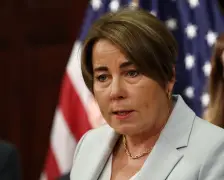From reckoning to backlash, Black women reflect on the stakes of the moment
This story was originally revealed by Errin Haines of The th Meet Errin and read more of her reporting on gender politics and agenda In as the world was gripped by the coronavirus the killing of George Floyd shocked Americans into action and into the streets by the millions protesting the unrelenting killing of Black people by police The moment sparked a nascent reckoning in America around systemic racism and institutional inequality in a large number of cases with Black women at the center They led protests and were hired to fix broken institutions and diversify boards They also did the emotional labor of educating their friends and neighbors Already the backbone of our democracy countless were called on to also be a bridge to racial healing Then it seemed like the country was ready to listen understand and move toward a freer fairer more equal democracy Five years later a multitude of of these same Black women find themselves at the center of a backlash confronted with attacks on the diversity equity and inclusion efforts that were previously championed As I reflected on the five-year anniversary of the start of the reckoning I thought about the Black women who were on the frontlines in the streets and workplace from the boardroom to the classroom At this milestone I requested to hear from them about what this moment had cost them then and now I reached out to several Black women I talk to often with a single question Five years after the racial reckoning of what did that moment ask of you and what if anything did it give back Their answers in their own words with particular editing for length and clarity were insightful and honest Journalist Nikole Hannah-Jones produced The Project a New York Times Magazine project that frames the beginning of the U S as the moment the first ship carrying enslaved African people arrived on its shore Regina Fleming Nikole Hannah-Jones staff writer The New York Times Magazine The so-called racial reckoning of solicited me to do all that I could with the platform I had to use that moment to push us past the superficial to a deeper historical understanding of what spawned the reckoning and the scale of the debt that justice required Those of us who are students of history who spend our time analyzing this country from a racial lens understood that the racial reckoning would not last long because the American attention span to injustice is invariably fleeting We also knew an intense backlash was sure to follow So I tried with my writing and my voice to push us as far towards transformation as attainable understanding the short window we had That was my obligation But in trying to fulfill that obligation the reckoning also questioned me to open myself up to an intensity of personal attack and efforts to discredit my work that I had never known In that period I saw how alone you can be in doing this work once it becomes unpopular In every way the so-called racial reckoning of was a time of clarity What did the racial reckoning of give back five years later It gave back everything The allies who marched in the street for racial justice have gone largely silent and companies have abandoned their efforts Black people striving for equality have been blamed for the electoral choices of White voters People are being killed by the police in higher numbers than they were when George Floyd was murdered And a crucial segment of the media has abetted the backlash Things have reverted so fiercely that the racial reckoning feels like it was but a dream because we are majority of certainly now living in a nightmare Joy-Ann Reid host and commentator The uprisings that spread across the United States five years ago despite the pandemic were passionate and multiracial Even the fires and the damage were swiftly revealed to be both rare and often caused by right-wing interlopers Minneapolis-based Target led a veritable corporate parade of embracing Black Lives Matter Black people Black executives Black small businesses and Black customers We watched as at long last military bases named inconceivably for Confederate traitors were renamed Even the face of American leadership and justice changed as a new president Joe Biden brought powerful Black women with him including Vice President Kamala Harris and Supreme Court Justice Ketanji Brown Jackson Still I honestly was shocked when former officer Derek Chauvin was convicted of killing Mr Floyd But it felt like a new wind was blowing in America But like everything in this country the wind shifted back promptly Trump defeated Harris to become president again The Justice Department has ended all federal intervention against violent police departments Trump s wholly unqualified defense secretary moved to change the names back The violent insurrection of January has been certified as patriotic and pardon-worthy by Trump and his party And our democracy itself is being dismantled around us by men and women whose apparent true religion is hating diversity equity and inclusion What I ve learned about America five years after George Floyd s population lynching on that ordinary street in Minneapolis is what I already knew that this country changes only with vicious reluctance and that it shows no greater passion than when it changes back Karine Jean-Pierre was the first Black White House press secretary and the first openly LGBTQ person to serve in that role Anna Moneymaker Getty Images Karine Jean-Pierre former White House press secretary As a Black woman I wasn t newly awakened in I was already living the reality the world was suddenly recognizing What that moment did ask of me was to hold space for others awakening to carry even more weight in naming and resisting the structures harming us all while navigating my own grief and exhaustion It demanded visibility labor and vulnerability often without adequate care or reciprocity And yet five years later I sit with the weight of this anniversary and ask Are we worse off now than we were then In multiple means yes The initial wave of momentum the commitments the DEI initiatives the promises of transformation are being undone or abandoned We re seeing backlash codified into agenda historical truths banned from classrooms and the language of equity distorted and weaponized This isn t fatigue it s systemic resistance And as we look around in current times it s hard not to feel that we are going backwards But that doesn t erase what the reckoning gave us sharper clarity deeper solidarity and a refusal to be gaslit It taught me that the work we do whether seen or unseen is sacred and ongoing I m reminded of the words of Maya Angelou We may encounter various defeats but we must not be defeated The system may try to undo the progress but our presence our resistance and our vision for justice endure Janai Nelson president of the NAACP Legal Defense Fund The racial reckoning dared Black people to suspend a cynicism born from centuries of betrayal in guarded hope that America might do better Five years later it s been reconfirmed that this country remains gripped by a deep-seated and irrational fear of equality and justice and has yet to learn the hard lesson of linked fate Nonetheless we are somehow stronger for it We have more converts to fight for racial justice More clarity about who are our foes And more resilience to withstand the battles ahead knowing that we who believe in freedom are growing in number with a generation that witnessed a radical reckoning that we can t unsee Karen Finney Democratic consultant It required everything And what it gave back is the unwavering understanding that we must continue not because the system is changing but because we are still here and we refuse to be erased I just couldn t sit through one more conversation where someone tried to soothe the nation with the same old platitudes This isn t who we are No This is who we are But it s not who we have to be The truth was undeniable especially in the midst of a global pandemic that was already exposing the deep layered inequities in how different communities were being impacted In polling and focus group work that summer even disparate groups like infrequent Black voters and White suburban women who leaned Republican agreed There was an urgent need for criminal justice and policing reforms Even countless in the political establishment largely run by White consultants who usually advise candidates to avoid talking about race had to acknowledge that silence was no longer an option What that moment required of me was to show up fully boldly unapologetically as a Black woman in politics I was called into and embraced by a circle of Black women where I could breathe cry and strategize We lifted each other up We worked to amplify our sister-leaders and push forward a national conversation about the need for leaders who bring a different lived experience The post From reckoning to backlash Black women reflect on the stakes of the moment appeared first on MinnPost


